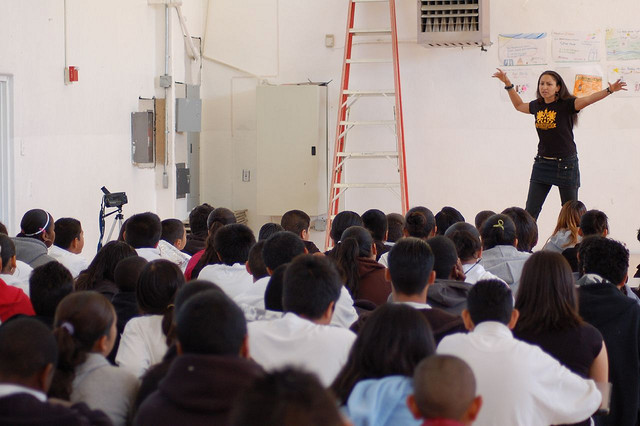Mariam Ahmed | Contributing Writer
It was in 1985, from the sticky pavements of Chicago city that slam poetry, or spoken word, was born, a product no doubt of construction worker Marc Smith’s feverishly creative mind. It was actually born long before that but only through the countless Monday nights spent crammed into the Get Me High Lounge , a Chicago jazz club, by the self-proclaimed ‘blue collar intellectual eccentrics’ did it really kick-off.
Poetry and spoken word might seem like one and the same but they are drastically different. At present, the American continent seems to be having a love-affair with the latter and appears to have forgotten the former. Since its birth, the spoken word phenomenon has taken America by storm. You can sell out, fill in and over capacitate any event or venue by simply putting the word ‘slam’ in front of it. One is led to wonder what the appeal of spoken word is. There is no definitive answer, but here’s what I think.
You can sell out, fill in and over capacitate any event or venue by simply putting the word ‘slam’ in front of it
America has always been a land of diversity, filled with so many different cultures, ethnicities and attitudes. To look for the attraction of spoken word, you can look to the African American’s history in America. The hip hop and rap movements, oral narratives forms, gave them the ability to form their identity and survive. It allowed them to identify themselves and relay this identity to the world. Those formats gave a voice to the minorities and the oppression they faced. Perhaps that is where the appeal still lies today. It’s a fact that at the heart of spoken word poetry is raw emotion and pain, be that from racism, sexism or bullying. It’s honest, interesting, and above all relatable.
Spoken word is an underrated format. Academics don’t take it seriously. They see slam poets as simply finger snapping hipsters looking for a fix and that’s what this all might be about –the fight for America’s artistic bourgeoisie. On one side you have the Poetry Society of America and all the universities, major publishers, university presses, Poet Laureates; everyone that makes up what is considered the respectable structure of the poetry establishment. And on the other side you have the National Poetry Slam; the street poets, coffee house poets, rappers, the outsiders of this ‘respectable’ structure. There is a constant struggle between these two spheres, academic vs. slam, raw vs. cooked. Whatever you call it, it comes down to classism.
Academic, ‘respectable’ poetry is aimed towards a Middle American audience, and apparently some people still believe that Middle America still just constitutes one kind of people and so academic poetry remains simple, safe, prosaic and white. America’s population has never been simple and singular. That style and form of poetry is stale and its time has passed. These audiences have been craving an art form that they can relate with more and spoken word gives them just that.
What helps in making this a rising phenomenon, particularly for young Americans, is the accessibility. There are so many things like Project V.O.I.C.E that exist and are aimed towards young people and helping them to find their voice and groups like Def Jam Poetry and Button Poetry which are easily accessed online. There are also several slam poetry competitions/events that exist in the US. This scene does exist in Ireland but it’s very insular. As is the way with new literary movements, you only know about it once you’re in the scene.
Despite this apparent lack (in comparison) of all things spoken word at present, there is still hope. Lewis Kenny, a spoken word poet and in charge of the poetry society in IADT thinks so: ‘’I do feel it’s what’s happening in Ireland, and the great bards we have here that is a driving force behind an ever growing scene.’’ It’s not to say that Dublin has nothing to offer, but there is a long way to go. ‘’Because of nights like Slam Sunday and Monday Echo, these can attract a younger crowd and has become an almost social hub for senior cycle/3rd level students, giving them a place and a platform to indulge themselves in the local scene. This can be seen with poets such as, Paul Curran, a recent UCD English graduate and also a slam champion of UCD. Also, Stephen James Smith, one of Ireland’s highest regarded poets is a 4th year English Media and Cultural Studies student of IADT. He is also one of the main organisers of Lingo, Ireland’s first spoken word festival.’’
Whatever is done remains at an institutional level, but the effect that students have on the scene can very much be seen and felt
He does think that the scene around colleges is still growing and at the moment, whatever is done remains at an institutional level, but the effect that students have on the scene can very much be seen and felt. He also talked about preparations that are going into organizing a slam poetry intervarsity. It will be Ireland’s first Inter-Varsity slam competition with representatives from NCAD, TCD, IADT, NCSI, UCD and NUIM. There will be 12 competitors, two from each college, battling it out for 1st, 2nd, and 3rd place. It is planned to take place on the 4th of December in NCAD.
Ireland is not the land it used to be. It has changed; it is filled with a miscellany of attitudes, thoughts, ideas, and people. As our Irish ancestors went over to America, The New World in search of new lives, people now come here looking for the very same thing. But the literary heritage and history remain. Ireland contains the same raw material to fuel a spoken word revolution of its own. It may not seem that way yet, but all great movements started in cafés, basements and even college committee rooms.







